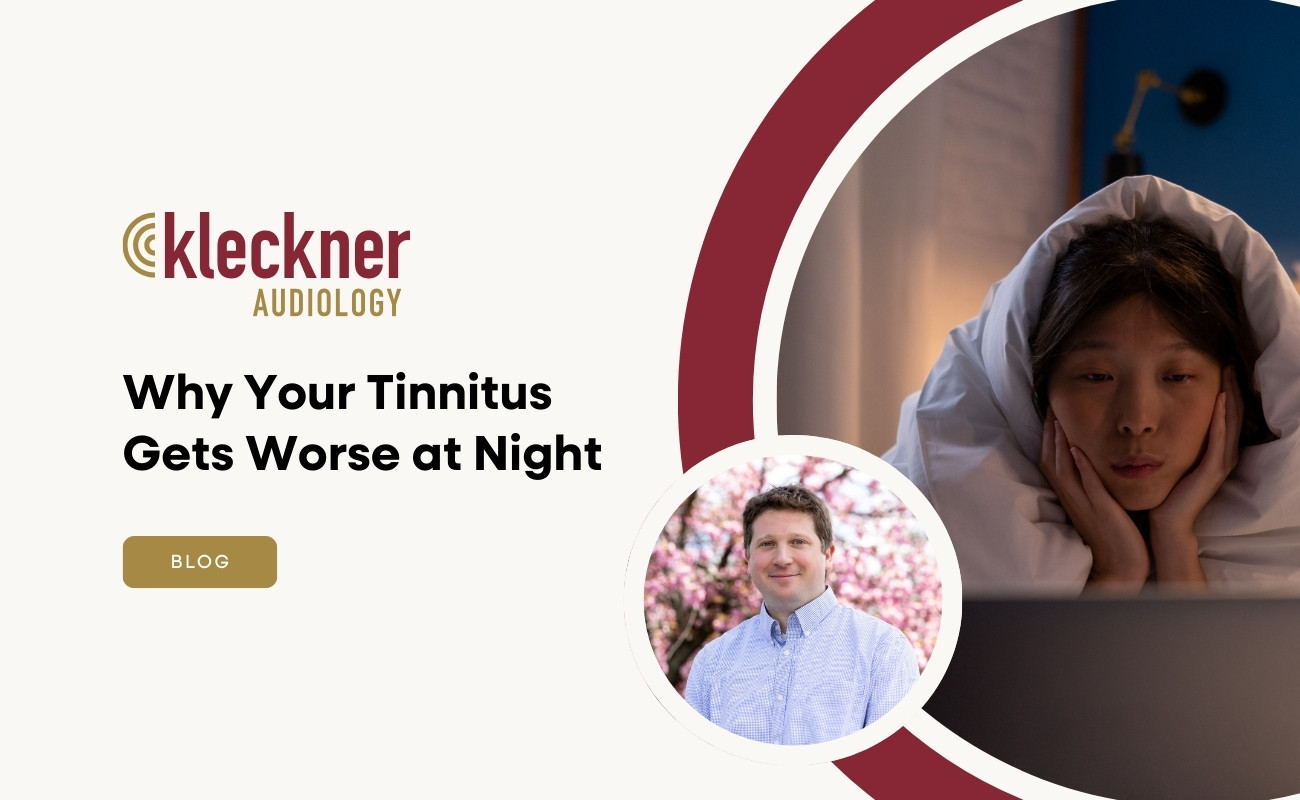Why Your Tinnitus Gets Worse at Night

90% of tinnitus sufferers report that their symptoms worsen in quiet nighttime environments, with the most common complaint being an inability to fall asleep due to increased ringing, buzzing, or hissing sounds. If you've noticed your tinnitus becoming more prominent when you're trying to wind down for the evening, you're not alone—and there are specific reasons why this happens.
At our Allentown practice, we frequently work with patients who struggle with nighttime tinnitus management. Understanding why tinnitus intensifies after dark is the first step toward finding effective relief strategies that can help you reclaim restful sleep.
The Science Behind Nighttime Tinnitus
Reduced Environmental Masking
During the day, ambient noise naturally masks tinnitus symptoms. The hum of traffic on College Heights Boulevard, conversations in nearby offices, air conditioning systems, and countless other environmental sounds provide a constant backdrop that helps camouflage the internal sounds of tinnitus.
When nighttime arrives and these masking sounds disappear, your brain suddenly has fewer external stimuli to process. This quiet environment allows the tinnitus sounds—which were present all day but masked—to become the primary auditory focus. Your brain amplifies its attention to these internal sounds simply because there's less competition from external noise.
The contrast between day and night environments is particularly noticeable in residential areas of Allentown. The industrial sounds that provide natural masking during daytime hours fade away, leaving many tinnitus sufferers feeling like their symptoms have suddenly intensified.
Stress and Anxiety Amplification
Cortisol levels and daily stress accumulation significantly affect tinnitus perception. By evening, the stress from work, family obligations, and daily challenges has built up throughout the day. This accumulated stress can make tinnitus more noticeable and bothersome.
The anticipation of bedtime can create its own anxiety cycle. Many patients tell us they begin worrying about their tinnitus as soon as they start getting ready for bed, knowing from past experience that the ringing will become more prominent. This worry creates additional stress, which can actually make the tinnitus louder and more intrusive—creating a frustrating cycle that makes sleep even more elusive.
Physical Changes That Affect Tinnitus
Blood pressure and circulation changes when lying down can intensify pulsatile tinnitus. When you transition from an upright position to lying flat, blood flow patterns shift throughout your body, including in the delicate structures of your inner ear. For those with pulsatile tinnitus—where the sound rhythmically matches your heartbeat—this position change can make the thumping or whooshing more noticeable.
Heart rate variations that occur naturally as your body prepares for sleep can also influence tinnitus intensity. Some people notice their tinnitus fluctuates with their pulse, becoming more prominent during the slower, more noticeable heartbeats that accompany relaxation.
Local Environmental Factors in the Lehigh Valley
Living in Allentown presents unique environmental considerations for tinnitus management. The industrial activity that provides natural sound masking during the day becomes notably absent at night, making the contrast between day and night sound environments more dramatic than in purely residential areas.
Seasonal changes in our region also affect nighttime tinnitus. During winter months, heating systems provide consistent background noise that can help mask symptoms. Summer air conditioning units serve a similar function. However, during mild spring and fall evenings when these systems aren't running, the sudden quiet can make tinnitus more noticeable.
The Lehigh Valley's allergen seasons—particularly spring tree pollen and fall ragweed—can contribute to sinus congestion that becomes more problematic when lying down. Congested sinuses can worsen tinnitus symptoms by affecting pressure in the ear and changing how sounds are perceived.
Physical Factors That Worsen Nighttime Tinnitus
Sleep Position Effects
Ear pressure changes when transitioning from vertical to horizontal positions. This is particularly relevant for people whose tinnitus is related to middle ear problems or Eustachian tube dysfunction. The change in head position can alter fluid movement in the inner ear, potentially intensifying tinnitus sounds.
Some patients find their tinnitus is worse when lying on one side versus the other, or when using certain pillow configurations. These position-related changes often relate to how blood flows through the vessels near the ear or how pressure is distributed in the middle ear space.
Jaw Tension and Sleep Bruxism
Many people unconsciously clench or grind their teeth during sleep, a condition called bruxism. Jaw muscle tension can directly impact tinnitus intensity because the temporomandibular joint (TMJ) sits very close to the ear structures. The muscles involved in jaw clenching share nerve pathways with those that affect hearing and tinnitus perception.
If you wake up with jaw soreness or headaches in addition to prominent tinnitus, teeth grinding might be contributing to your nighttime symptoms.
Effective Management Strategies We Recommend
Sound Therapy Options
White noise machines or apps can restore the masking effect you lose at night. We often recommend patients experiment with different types of background sounds—some prefer consistent white or pink noise, while others find nature sounds like rain or ocean waves more soothing.
The key is finding sounds that mask your tinnitus without being stimulating enough to keep you awake. Volume should be set just loud enough to provide relief without overwhelming the tinnitus sounds completely.
Hearing Aids with Tinnitus Features
Modern hearing aids often include built-in tinnitus management features. Many of our patients find significant nighttime relief using hearing aids with integrated sound generators. These devices can provide customized masking sounds while also addressing any underlying hearing loss that might be contributing to tinnitus severity.
For patients with hearing loss, addressing the hearing deficit often reduces tinnitus prominence during both day and night hours. When your brain receives more complete auditory input, it's less likely to create or amplify the phantom sounds of tinnitus.
Sleep Hygiene and Relaxation Techniques
Stress reduction techniques practiced before bedtime can break the anxiety-tinnitus cycle. Deep breathing exercises, progressive muscle relaxation, or gentle stretching can help lower overall stress levels and reduce the body's tendency to amplify tinnitus sounds.
Creating a consistent bedtime routine that doesn't focus on the tinnitus can help redirect your attention away from the sounds. Many patients benefit from reading, listening to audiobooks, or practicing meditation as transitional activities.
When to Seek Professional Help
If nighttime tinnitus is significantly impacting your sleep quality or daily functioning, professional evaluation can identify underlying causes and appropriate treatment options. We provide comprehensive tinnitus evaluations that include pitch and intensity matching to better understand your specific symptoms.
Our approach combines thorough hearing testing with tinnitus-specific assessments to develop personalized management strategies. This might include hearing aids with tinnitus masking features, sound therapy recommendations, or referrals to other specialists when appropriate.
Take Control of Your Nighttime Tinnitus
You don't have to accept sleepless nights as an inevitable part of having tinnitus. Understanding why your symptoms worsen at night is the first step toward finding effective management strategies. Many of our patients experience significant improvement in sleep quality once we identify the right combination of treatments for their specific situation.
Schedule a consultation with our experienced audiologists to discuss your nighttime tinnitus symptoms and explore treatment options that can help you achieve better sleep. Call us at 610-435-8299 to begin developing a personalized approach to managing your tinnitus and reclaiming restful nights.

Dr. Peter Kleckner, Au.D., a seasoned audiologist with experience from prestigious institutions, brings his expertise in comprehensive hearing evaluations and treatments to Kleckner Audiology, where he's been serving patients since 2016.



